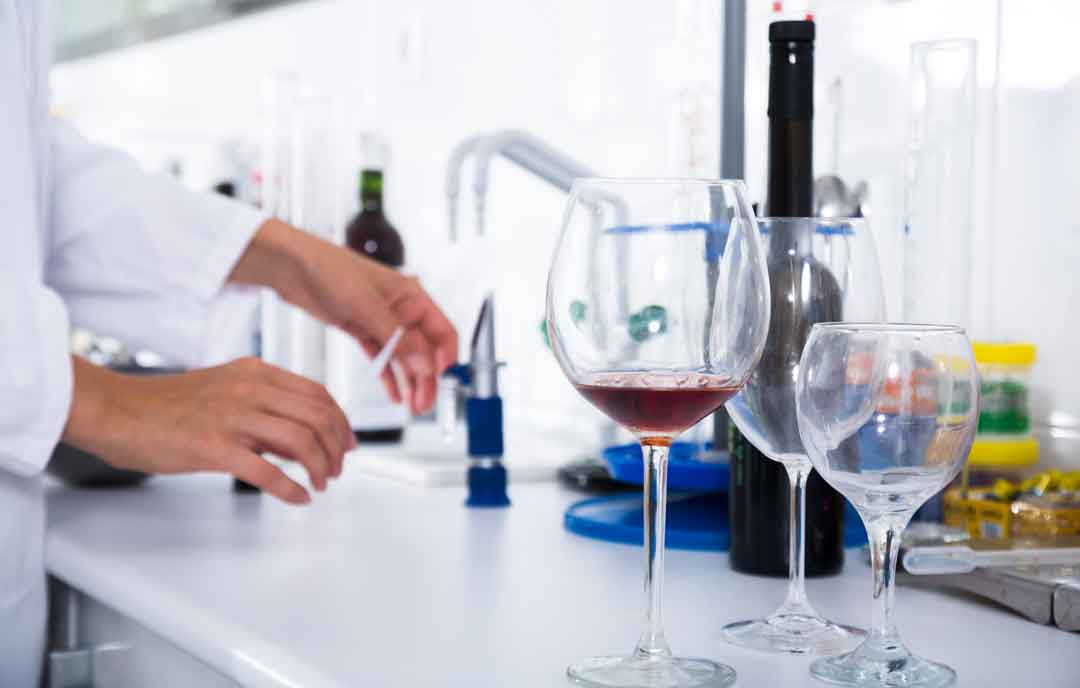Technological innovation is turning the world of wine upside down. With the rise of synthetic wine, some researchers are exploring the possibility of creating wine without growing vines. This approach raises many questions. Can we truly reproduce the complexity of a grand cru? What are the challenges and stakes of such a revolution?
The origin of wine in the laboratory: a scientific breakthrough
The foundations of wine technology
Wine-making is based on complex biological processes. Once harvested, grapes undergo fermentation, transforming sugar into alcohol. In the context of future viticulture, scientists are seeking to isolate and recreate these reactions in the laboratory.
Researchers use wine technology to identify and reproduce the aromatic components of a grand cru. Using advanced chemical analysis, they reconstruct the molecular structure of the wine, combining various compounds extracted from fruit and natural yeasts.
A multi-stage process
To obtain a synthetic wine, scientists follow several steps:
- Extraction of the aromatic and taste elements present in grands crus.
- Association of key molecules to reproduce the sensory profile of the wine.
- Adjusting the proportions of tannin, acidity and sugar for perfect balance.
The aim is to create a wine that comes as close as possible to traditional crus, without going through the vineyard.
The stakes and challenges of synthetic wine
Can taste and quality be identical?
Wine lovers attach great importance to terroir. It influences the structure and aromas of a wine. Researchers try to reproduce these nuances by adjusting molecular composition, but some experts believe that nothing can replace the unique expression of soil and climate.
Initial tests have produced surprising results. Sommeliers were invited to taste synthetic wines in comparison with traditional wines. In some cases, the difference was imperceptible. However, the complexity of aged wines and the evolution of aromas remain major challenges for laboratory producers.
The benefits of wine in the lab
Despite misgivings, synthetic wine has several advantages:
- Less environmental impact: the absence of vines reduces water consumption and the use of pesticides.
- Controlled production: climatic variations no longer disrupt harvests.
- Greater accessibility: wine lovers could access rare taste profiles at lower cost.
However, these innovations still come up against technological limits and ethical issues.
Implications for the wine industry
An upheaval in the wine market
The rise of synthetic wine could redefine the global wine economy. Traditional producers see the technology as a threat, while some see it as an opportunity to innovate.
Grand crus may retain their prestige, but synthetic wine could become an alternative for the general public. Brands will have to adapt to this evolution by integrating these new production methods into their offer.
What does the future hold for traditional viticulture?
The emergence of laboratory wine does not mean the disappearance of traditional wine. Future viticulture could combine tradition and innovation, using biotechnology to improve winemaking without denying the authenticity of terroir.
Some wine-growing regions are already experimenting with the use of modified yeasts or controlled fermentation processes. These advances make it possible to refine a wine's characteristics without altering its authenticity.
Limits and challenges
An ethical and cultural debate
The rise of synthetic wine raises profound questions. Can we still talk about wine if the vine is removed from the equation? Does a wine's identity rest solely on its chemical composition, or on the history and know-how of the winemaker?
Wine lovers attach great importance to the sensory and emotional experience of wine tasting. For many, wine is not just about taste, but also about cultural and historical heritage.
Regulatory and legal aspects
Regulatory bodies will have to rule on the legality and classification of synthetic wine. Can it benefit from an appellation d'origine contrôlée? Will it have to be marketed under a new name?
In France, where wine is a deeply rooted tradition, the marketing of vine-free wines could meet with strong opposition. However, other countries more open to innovation could be pioneers in this field.
Wine in the laboratory: a promising future?
Innovation in wine technology continues to progress. Researchers continue to refine their techniques to get closer to the great vintages. While synthetic wine will never completely replace traditional wine, it could become an innovative and sustainable alternative.
Acceptance of laboratory wine will depend on the consumer. Those seeking unique taste experiences will be curious to discover these new creations. However, wine purists will remain attached to the values of terroir and the vine.
Conclusion: a revolution in the making
Synthetic wine represents a major technological advance that could transform the wine industry. Although challenges remain, the prospects offered by this innovation are promising and are arousing growing interest among wine lovers and professionals alike.
If you enjoyed this article, you may also be interested in "Bordeaux wines: everything you need to know about these grands crus"!





